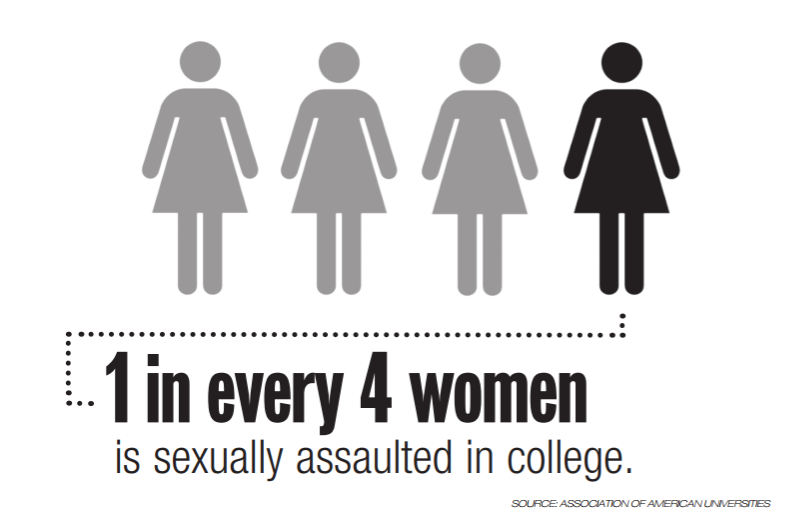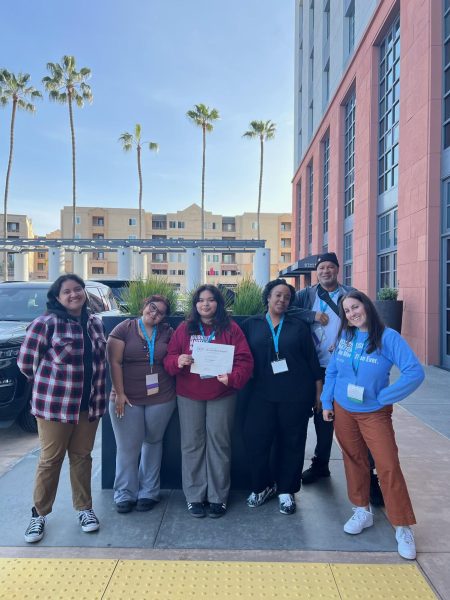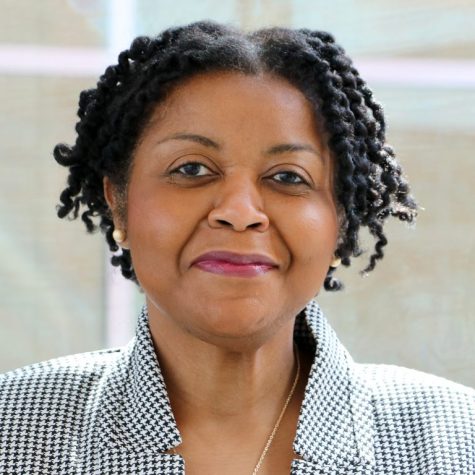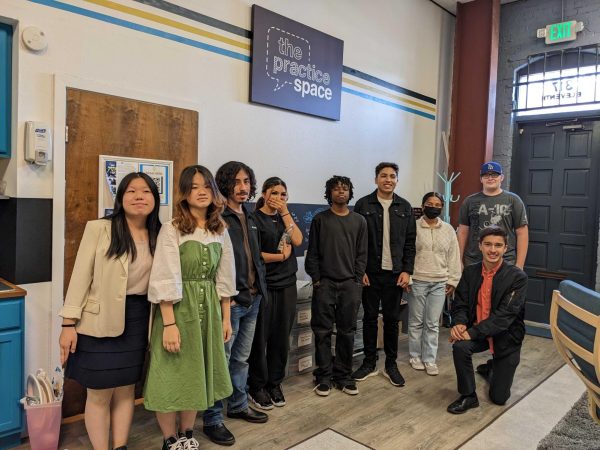Harassment scars victims’ self worth
Women on college campuses are at an elevated risk of being sexually harassed, but most of these crimes go unreported
October 21, 2016
Every 109 seconds a person experiences sexual assault. However, only six out of 1,000 rapists will end up in prison.
College women are more likely to be sexually assaulted than robbed and they often do not report sexual assault to law enforcement.
This is true despite statistics stating that women between the ages of 18-24 are at an elevated risk of experiencing sexual violence.
What is sexual harassment?
According to Rape, Abuse and Incest National Network (RAINN), an American anti-sexual assault organization, sexual harassment is unwelcome sexual advances, requests for sexual favors and other verbal or physical harassment of a sexual nature in the workplace or learning environment.
Contra Costa College Dean of Students Services and Title IX Coordinator Vicki Ferguson said the district has a sexual harassment informational module called “Not Anymore,” created for new and returning students.
Contra Costa Community College District Associate Vice Chancellor of Educational Services Sally Montemayor Lenz said, “It is important as a community to provide these resources for students, although it is mandated to have these resources readily available. Sometimes students don’t understand how to recognize the signs of sexual violence.”
Examples of sexual harassment
Liberal arts major Vanessa Diaz said she defines sexual harassment as verbal or the touching of inappropriate places or when someone approaches someone the wrong way and it gets uncomfortable.
“When I go out and a guy thinks it is OK to slap my butt at the club, that is sexual harassment,” Diaz said.
Middle College High School student Duane Jones said, “When you go overboard and you touch a (woman), that is the point of no return. It can scar her. It can affect her future and she might even begin to feel like a sex symbol.”
Diaz said, “I tell them not to (touch me), but I don’t want to be rude and cause them to get mad because that person might attack you.”
Diaz said as a woman she feels like she is not taken seriously and feels uncomfortable to let men know that she feels unsafe in a situation.
“They (men) usually laugh. I don’t think they take it as serious as it is. They don’t take us seriously. Maybe they take it as if we want that kind of attention.”
Ferguson said “We want to make sure if we have someone on campus who is accused of sexual harassment that we have to investigate.”
As Title IX coordinator, Ferguson’s role is to ensure any student reporting sexual harassment is safe.
“I let them know that we will keep them informed of what is going on with perpetrator. It will be in writing.”
Under Title IX, an education amendment signed in 1972, discrimination based on gender is prohibited in all programs or activities that receive federal financial assistance, including colleges.
“Historically, when people thought about Title IX, they thought about women’s sports,” Ferguson said. “It’s a gender equality bill. It protects men, women and anyone with any sexual orientation or religious affiliations.”
Population on campus
Director of Admissions and Records Catherine Frost said CCC’s enrollment is 59.1 percent women with a 3,791 total headcount, 39.77 percent men at 2,251, and 1.14 percent unreported gender at 73, Frost said.
“Gender should not play a role at all in sexual harassment. It should be a zero tolerance policy on all college campuses,” she said.
Political science professor Vanna Gonzales said, “Sexual harassment affects the learning environment in so many different ways. Fundamentally, I think it starts with the administration and how they communicate to faculty and students about what is tolerable and what is not.
“I think it affects the culture of an institution a lot because a lot of it is dictated by social norms that determine when people speak up and what they speak up about. And if there is prolific sexual harassment it gives the message that people who say something about it are trouble makers vs ‘we encourage people to say something because we don’t tolerate it here at this institution’,” she said.
Ferguson said Title IX is for any student or staff member who is susceptible to sexual harassment on campus.
Reporting the situation
According to a report from National Sexual Violence Resource Center, one in five women and one in 16 men are sexually assaulted while in college.
Lt. Tom Holt said since his arrival at CCC in the fall of 2015, about one or two report requests have been made regarding sexual harassment, but he cannot clarify whether one of the reports was officially classified as sexual harassment.
“For us, when someone comes in and they want to make a report, we ask, ‘was it sexual harassment? Was it a sex crime?’ Not that one is less than the other, but what does the victim want?”
Holt said some people may feel violated but don’t know that what happened to them is an actual crime.
If it’s hands-on, then it falls into the criminal area, but in order to investigate, the victim must want to proceed with the investigation, Holt said.
“I’ve done a lot of sex crimes (outside of CCC) in my career. And it’s always up to what the victim wants to do, and we try to make them feel as whole and make them feel as safe and comfortable as possible.
“I can never say ‘I understand,’ because I don’t. I have never experienced sexual harassment, and to tell someone that you understand sometimes minimizes their situation.”
Holt said under California Penal Code section 293, any law enforcement employee who receives a report from a victim of a sex offense must inform the victim that their name will become part of public record unless the victim requests to keep it confidential.
Holt said, “We are a police department and a victim (of a sex offense) has the right to anonymity. Their information can remain solely with us. We don’t have to tell the rest of the school.”
Gonzales said, “(Reporting sexual harassment) is intimidating, so I am always trying to say, ‘You have to create the public record. You have to make the complaint.’ And that is a sacrifice that we have to make.
“When they look at the file and see that this guy has 20 complaints against him, a victim may feel it might not benefit them to file a report, but that track record benefits the institutional bias that is created.”
Holt said it is typically women who may feel violated, but not feel it was sexual harassment or may not want to come off as a “tattletale” or may not know who to contact.
“First of all try being assertive, but know that many people have the luxury of being able to be more assertive because of the position of power or relative power they possess. And the other thing is that there are negative consequences of someone who is super sensitive to any particular thing.
“So I am thinking whether it is class-based bias, racial-bias or gender-based bias that causes them to not be taken seriously because they are the one taking this action,” Gonzales said.
The effects
Gonzales said, “I think a lot of women in political science are more, what’s the word that doesn’t have a negative connotation? Because it is often categorized as aggressive — or assertive.
“To be in this field you have to be really assertive.
“I am a really outspoken person, which is probably why I chose this career pathway.”
Gonzales said, “My mom and my aunt really care about what people think. It’s a chilling factor when the norm is that you don’t do this and that is not acceptable for someone like you, who is a woman, or maybe someone who doesn’t have a professional position. Or if you are a student.”
College President Mojdeh Mehdizadeh said, “It’s important to let them (students) know that they are appreciated and respected. We need to create a safe environment for students.”
Middle College High School student Jessica Fernandez said, “Sexual harassment can happen anywhere, which is why you have to stay in groups, with people you trust.”
Fernandez said sexual harassment does not have to be verbal or physical, it can be getting close to someone and invading their personal space.”
Diaz said, “When a guy sends a girl a message through social media constantly saying things like ‘hey wanna go out?’ “You look good.’ It’s annoying and you want them to stop. It is a form of harassment.”
Middle College High School student Kamarrie Green said, “I think the line of sexual harassment is crossed when it involves touching someone without their permission.”
Green said he felt he was a victim of sexual harassment but everyone thought it was funny when he spoke about it.
“I had a friend who was gay, and I was really homophobic at the time, but my best friend helped convince me to change my views.
“There were multiple times where he would reach over, while we were with our group of friends, and he would reach over to touch my butt. I would tell him to stop, but he kept doing it.”
Green said he was contacted via the social media app KIK app after the occurrence.
“He asked me why I was ignoring him and what had he done to deserve it. I told him and he tried to deny it. He denied everything.”
Green said that guy is no longer part of his friends’ group.
Middle College High School student Nia Alexander said, “I remember getting off the bus on Macdonald Avenue one day. A man whistled at me and asked me if I wanted to go on a date with him. When I told him no and that I was 17 years old, he told me it was OK, that he didn’t mind.”
Alexander said it all starts with what society teaches us about how things should be.
“I don’t think it is stopping anytime soon,” she said.
Mehdizadeh said, “Sadly, I think it sure is what has been designed as a cultural norm. There are individuals who think it is part of the culture that has developed and it needs to change. There are individuals who think catcalling is a form of flattery.”
Although Mehdizadeh said she has not experienced sexual harassment on the CCC campus, she said she has heard “foul” language used toward other students.
Environmental science major Kate Campos said, “I usually just ignore them. I do notice, but I don’t like to give men eye contact.
“The other day when I was getting off of BART a man was staring at me. I was wearing a dress and I felt uncomfortable with him staring at me.
“I was debating on whether I should have worn a dress because it can make women feel uncomfortable. It also makes me wonder, ‘Why can’t I wear a dress and show my legs?’ The unwanted attention usually comes from older men.”
Ferguson said, as administrators, they are responsible for students even if sexual harassment happens outside of the campus.
“My role is to support you, so that nothing is hindering your education. You have the right to your education. Accommodations have to be provided for the victims,” Ferguson said.
Gonzales said the approach to combat sexual harassment on a campus is “relevant.”
“There has to be this sense that the administration is not singling out men or particular men. This is what defines an institution’s culture. We want to enforce that, and make sure we do that with everything we do. We try to appoint balanced boards We try to make sure in hiring evaluations. We have a balance of men and women. That is the policy we have.”
Gonzales said, “In community colleges, the student population is mostly women — not just in California, but at community college in general. There are more women graduating from four year colleges as well.
“I think sometimes women themselves are hesitant to come forward because of the fear of negative things happening to them — victim shaming. Look at what is happening all over the political environment,” Gonzales said.
Solutions
Gonzales said, “I am always counseling people on how to be assertive, because some people will assume you don’t care if you don’t say anything. Some people believe if you don’t make noise then you don’t care enough to do something about it.
“And then it gets thrown back in a woman’s face. ‘If they cared they would have launched a complaint. If they cared or if it was bad enough, they would have taken me to court. They didn’t, so see, I didn’t do anything that bad because there is no formal record of anything.’”
Diaz said in order to put a stop to sexual harassment, women should speak up and not allow it to happen.
Holt said his plan is to have more police aides watching the space in front of the Bookstore, and a camera has already been installed there.
“We’ve already had a fight in that area,” he said.
Holt said the plan is to put signs near the area where the surveillance camera is stating that harassment of any type will not be tolerated on campus.
Ferguson said Title IX posters will be put in classrooms in Spanish and English, with instructions of how to report harassment and what defines sexual harassment is in the 2016-17 catalog.












